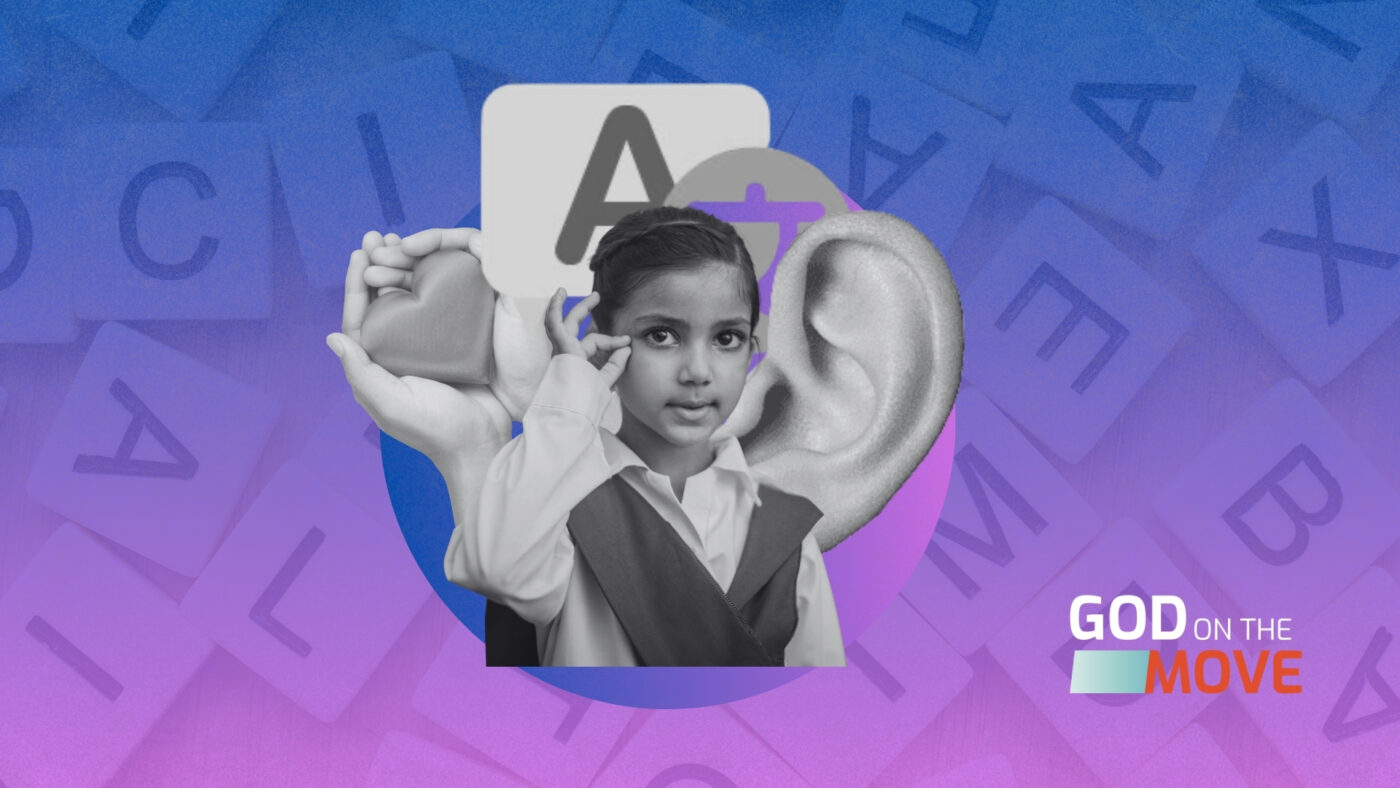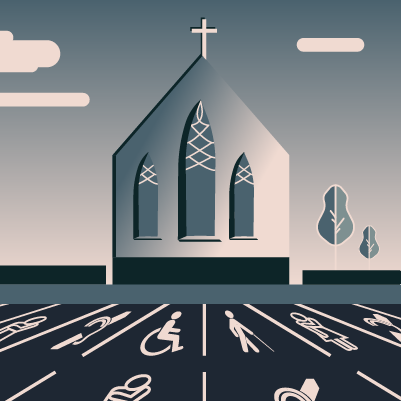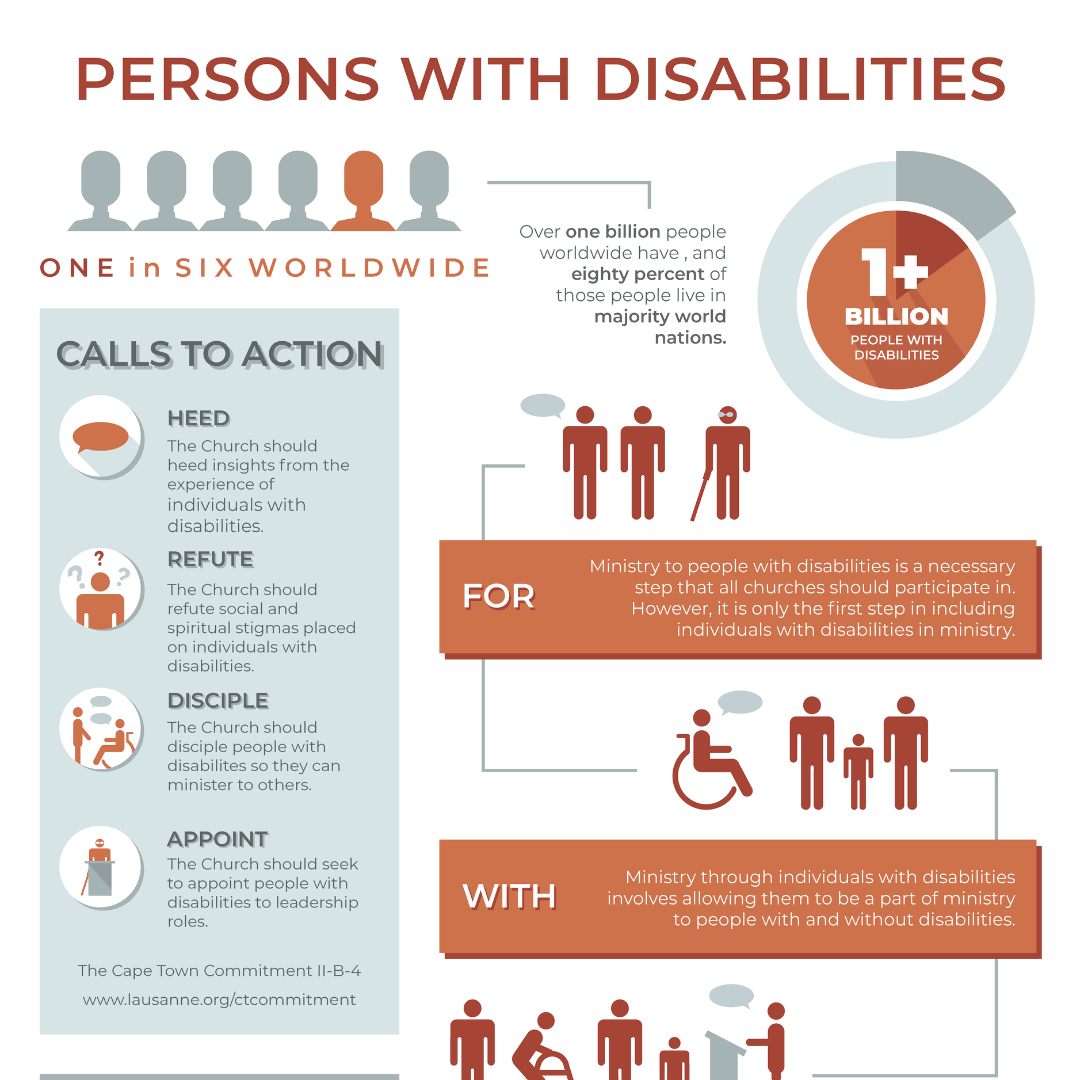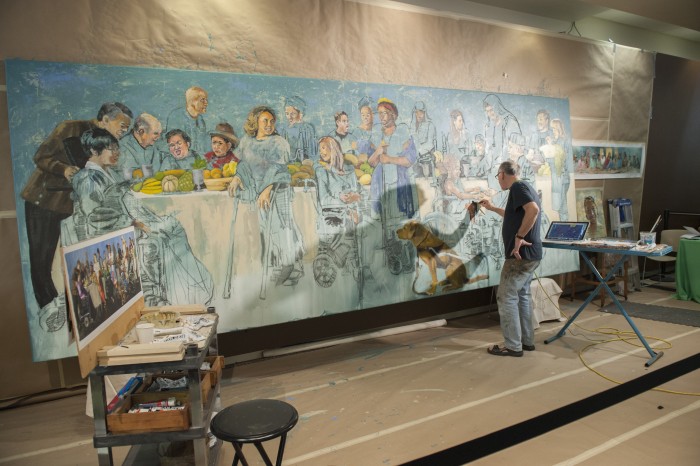Opportunities for People with Disabilities
Of an estimated 8 billion people in the world today, 1.3 billion have disabilities. About 80 percent live in the majority world. This means that roughly one out of six people in the world has some form of disability. Addressing this need requires a complex mission strategy to reach and engage people with disabilities. This population has no demographic boundaries. They are present in all people groupings, speaking all languages, and populating all cultures. Even those who live in largely evangelized people groups remain significantly un-reached. What is disability, and how can we reach people who are affected by it?
Defining disability is challenging because the term represents a broad, complex, and diverse idea. A person can have a physical, sensory, developmental, or intellectual disability, and even experience mental health problems or combinations of disabilities in varying degrees. It may help to think of disability in terms of functionality, although it needs to be acknowledged, consistent with the WHO definition that environmental and social barriers contribute to the impairment of a disability. People with disabilities can face social segregation leading to isolation. Sadly, stigma and physical barriers—not disability itself—prevents many from going to church. How far does stigma go in creating social barriers?
Supporting people with disabilities and their families to participate in church has missiological implications.
Some societies or cultures perceive disability as shameful because they consider the disability to be the result of a person’s personal or parental wrongdoing, karma, or bad luck. Consequently, family members may be reluctant to bring their loved one with disability to church activities. But the church is called to be a loving community that welcomes everyone. All people need to hear and spread the good news of God’s love and salvation in Christ.
Supporting people with disabilities and their families to participate in church has missiological implications. Caring for them includes tangible expressions of the love of God to those who are often absent from, hidden from, or overlooked by the church. With greater awareness, visibility, and inclusion, people with disabilities can become active members and contribute to the body of Christ. In other instances, this could mean giving hope and strength to care-worn family members. In all ways, we show and share the love of Christ.
Encouragingly, people with disabilities have made progress in church participation over the last several decades. Whereas we once treated them primarily as recipients by offering care to them, we have increasingly recognized the need to participate in church with them. We progressed from segregating special ministries to full side-by-side church fellowship. Today, we witness a growing awareness of people with disabilities in all church and mission leadership roles, receiving ministry from them—beyond fellowship to shared ministry participation. As Joni Eareckson Tada has said, ‘Disability ministry is not disability ministry unless the disabled are ministering.’1
People with disabilities need to hear the gospel and grow spiritually. The church should include and welcome them, for they too are created in God’s image and have dignity. Yet, they are more likely to experience physical and social barriers to full inclusion and participation. The church must encourage and support them to actively participate as well as serve as co-workers in fulfilling the Great Commission.
What will it take to include people with disabilities fully into church life and mission? Reaching and engaging them will require multiple strategies: everything from biblical training on disability to physical ramps! Scripture teaches us that the church must bring in, build up, and send out people with disabilities.

Bring in: Including people with disabilities
Jesus’ parable in Luke 14 contains what is often referred to as the Luke 14 disability mandate (14:15-24), which envisions people with disabilities sitting at the banquet table. The mandate echoes Jesus’ call to go out and make disciples of all nations (Mathew 28:18–20). However, reaching people with disabilities can be challenging as they are often a hidden population, especially in societies where disability is considered shameful for the person as well as their family.
We need to reach out to people with disabilities with the love and good news of Jesus Christ and bring them into the church. The means and methods should be as diverse as the persons and their families, though at its heart, it is the outpouring of Christian love and compassion. Such compassionate outreach has been part of our Christian tradition for the past two millennia. Christians should be aware of and increasingly engaged in such compassion ministries.
Therefore, the ways in which we minister to people need to be contextualized. For example, in places where disability care and services are hardly available, the church can provide such services. In other contexts where disability care and services may already be provided, churches can seek to build meaningful friendships with people with disabilities in their community.
However, many people with disabilities—and their families and caregivers—live isolated from the wider society. Often, the disability means that they are not able to physically come to church. Thus, God’s people bringing the church to them can help to bridge that gap. For example, one way to take the church to them is via vocational care workers in health, education, and social services who are in regular contact with people with disabilities. These care workers can be equipped to provide the necessary spiritual care.
Welcoming people with disabilities and their families into the church is but a precursor to the great banquet where ‘the poor, the crippled, the blind, and the lame’ (Luke 14:15–24) are ‘us’. Not us and them! It will grow the church, because ministry to all, including those with disability, contributes to the fulfilment of the Great Commission.
What a difference it would make in our world when people with disabilities who are hidden or marginalized find eternal hope in Christ. Like we do, they would hear about Jesus and receive the spiritual care we all long for and need. This would mean fulfilling a significant part of the gospel going out to the ends of the earth.
Build up: Actively engaging people with disabilities in the church
Although some churches and Christian agencies have reached out to people with disabilities, they have not always been successful at building inclusive communities and churches where people with disabilities are actively engaged in church life and ministry. We need to aim for a church where we can talk about ‘us’ and ‘our’ ministry: people with and without disability all one in Christ.
Welcoming and Nurturing Their Gifts
It is estimated that between 10 and 24 percent of a population have a disability. Yet, church surveys of North America and Australia indicate a much lower percentage of people with disabilities in the church.2 Clearly when those with a disability are not included in the faith community, churches are incomplete representations of the body of Christ and lack the spiritual gifts that these believers could contribute. By this measure, the church itself is disabled! Thus, it is not only a matter of reaching people with disabilities with the gospel but also including them in the church, building them up in discipleship, and providing opportunities for them to actively engage in the life of the body of Christ.
It is the church’s role to respond to the spiritual needs of people with disabilities. As the church provides spiritual care and discipleship for anyone, so it should disciple people with disabilities and their families, enabling, equipping, and empowering them to use their gifts.
People with disabilities have unique experiences and perspectives with which they can enrich the church’s understanding of God, the kingdom, and the good news. Therefore, their engaging presence will strengthen the church community. By including people with disabilities, the church:
- Creates a more diverse and vibrant faith community that values and celebrates the unique gifts of all its members, where ‘the parts that we think are less honorable we treat with special honor’ (1 Cor 12:12–31).
- Will be a prophetic voice in societies which often draw their strength from power and prestige.
- Presents a more welcoming and inclusive environment for other types of differences such as ethnicity and class and reaches out to a diversity of people in society.
- Completes the scope of the Great Commission by including all people.
Barriers in the Church
Although many churches have improved on including people with disabilities in the church, sadly there are still many that, perhaps unintentionally, exclude them. One reason is that their facilities and programs are inaccessible. But not only may there be physical barriers, they also may have attitudinal barriers which hinder people with disabilities from experiencing belonging to the church. That’s why the ongoing challenge is to raise disability awareness in local churches and to equip them to welcome people with disabilities, as they would anyone else. By actively exploring how to do this, they can create a more accessible and welcoming church environment for all.
Although engaging with people with disabilities may start out of compassion, churches also need to know the biblical and theological foundations for such ministry. Moreover, they need practical ministry skills to appropriately reach out to people with various/specific disabilities, as well as leadership skills to build up the church in disability ministries. Additionally, there is a need for pastoral counseling, training and care for family members and caregivers of people with disabilities.
Therefore, to equip the church in building up people with disabilities, we need robust theological education and training. Courses in disability theology, missiology, and ministry are slowly becoming available, but this area is still underdeveloped in many parts of the world. This is where partnerships can be developed. Churches and individuals with greater resources—personnel, training programs, finances, or specialized abilities—can partner with those who have less. Some churches may have finances but not personnel, while others may have suitable training programs which can be contextualized for other places. Many ministries are uniquely positioned as platforms where needs and resources in various communities around the world can be made known, resources shared, and partnerships forged. Leaders connected within their communities or regions are well positioned to do this. These partnerships could support the gospel going out to people with disabilities and building them up for individual spiritual growth and ministry participation.
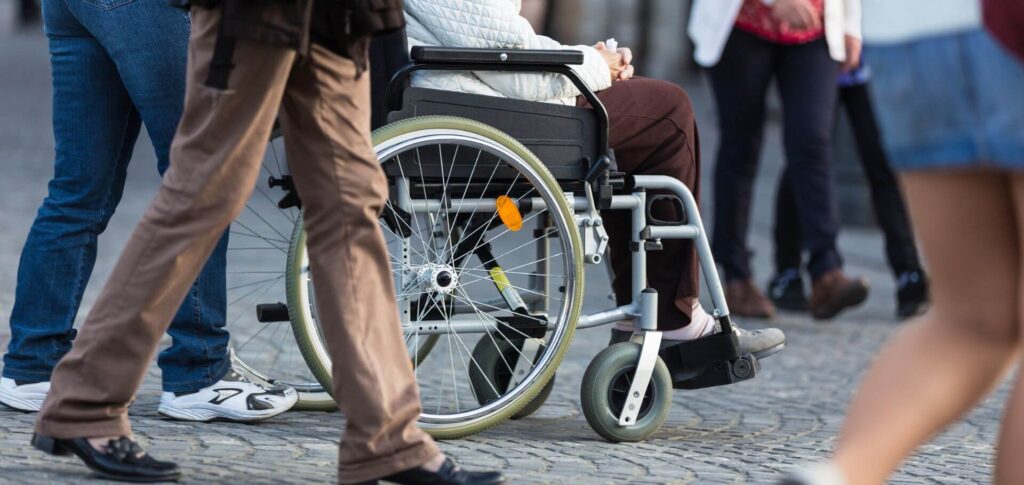
Send out: Enabling people with disabilities to take part in God’s mission
Everyone should have a role to play in ministry and mission, including people with disabilities.3 The Great Commission includes people with disabilities, for all are to respond to the command to ‘go and make disciples’. After all, they are commissioned, called, and gifted. Yet, people with disabilities are often overlooked in missions despite having unique giftings, experiences, and perspectives that enrich Christian witness and help fulfill the Great Commission. Why is it so important to enable people with disabilities to be part of local church ministry and missions?
Too Critical to Overlook
First, including people with disabilities in all aspects of Christian ministry is a powerful witness to an unbelieving world. Seeing the church’s love and inclusion on display demonstrates that the church lives what it teaches. For example, including people with disabilities in mission can break down cultural, class, and societal barriers that prevent other people from hearing the gospel message.
Second, including people with disabilities in mission helps us share the love of Christ to other people who may feel excluded or ignored, such as refugees, migrants, and the poor. The common experience of being marginalized from society but finding their identity in Christ in the face of disability can speak powerfully to all those who experience stigma for other reasons.
Including people with disabilities in all aspects of Christian ministry is a powerful witness to an unbelieving world.
Third, people with disabilities can most effectively raise awareness and address barriers that they face in accessing the gospel, such as physical or sensory limitations. People with disabilities involved in mission help us ensure that we use creative and alternative media to communicate the message to those who are deaf, blind, non-verbal, or have a physical or intellectual disability. This makes the gospel message more accessible to everyone. For example, an average 80-year-old may have some hearing deficits but will benefit from accommodations made for the deaf. When we adapt media—through visual presentations, multimedia, or simplified gospel presentations—it increases access to the gospel for everyone. The gospel can then go out to the ends of the world more effectively.
Making the gospel more accessible in creative ways can also facilitate gospel communication across language and ethnic divides. This is where current technology can be of great assistance. Many types of resources can be shared online, so that communities which may have fewer resources can also benefit. On the flipside, communities in the majority world, which may have similar honor-shame cultural dynamics, can share their projects with each other and so build up their ministries. For example, speech-to-text software can help to adapt messages so that those with hearing impediments can see them. We can now make and share training videos easily and inexpensively using a smartphone. We can also creatively and wisely use these technological tools so that some people may hear the message (1 Cor 9:22–23).
Finally, people with disabilities are uniquely placed to reach out to others with disabilities. People with disabilities often have networks and communities that are not reachable by traditional methods. By including people with disabilities in Christian ministry and mission, we can reach a broader range of people and spread the gospel message to others who may have previously been overlooked.
Ongoing Challenges
All of us, with or without disabilities, must take an active role in mission. We are making progress in facilitating the missional call of people with disabilities. However, an ongoing challenge for many mission organizations and churches is that they feel ill-equipped to send out people with disabilities. They are concerned about the personal risk involved for a person with disability to go on mission, or they feel ill-equipped to support their additional needs. They may even fear mission failure due to the disability barriers. How can we equip mission organizations to send out and support gospel workers with disabilities?
We need to help mission organizational leaders become more disability confident. Meaningful first steps might be raising awareness of physical and digital accessibility within organizations, supporting leaders in developing policies or guidelines for disability inclusion, and training them in practically assisting workers with disabilities in the mission field.4

The Way Forward
Reaching people with disabilities for Christ, building them up in the body of Christ, and sending them out as mission workers has significant potential for fulfilling the Great Commission. It requires a collective effort from local churches, mission organizations, and vocational workers, but most importantly people with disabilities, for they will play a critical role in helping the church and mission organizations understand how to support them and minister alongside them. Additionally, we need to acknowledge their leadership potential in the local church and in Christian organizations which may require focused leadership development.
Only together can we further the Great Commission. As the global church comes to a better understanding of the needs and resources available to people with disabilities, it can develop a web of partnerships. The church needs these partnerships for this work.
Jesus’ authority and personal presence, mediated through his Word and Spirit are our primary resources. The church is the conduit for reaching out, building up, and sending out. The Christian community, whether the church or fellowship groups, both local and—where technology allows—international, are central.
If we (those with and without disabilities) labor together we can close the mission loop in which those with disabilities who are reached will then reach others in the next 26 years (until 2050). We believe that the church can reach out to the 1.3 billion people with disabilities, include them fully in its fellowship even if remotely, and send them out to serve. This State of the Great Commission Report is our time capsule to be opened in 2050. May they look back at our 2024 report and ask, ‘Why the need to talk about “us” and “them”? It’s just “us”!’ The results are up to all of us in Jesus’ church.
Resources
- Anon. ‘Mission to the Disabled and Mission of the Disabled.’ Luke’s Journal 19, no. 2 (September 2014): 24-26.
- Benjamin T. Conner. Disabling Mission, Enabling Witness: Exploring Missiology through the Lens of Disability Studies. Downers Grove, IL: IVP Academic, 2018.
- Brent Burdick. ‘The Lausanne Global Classroom on Disability Concerns.’ The Lausanne Movement. https://lausanne.org/lausanne-global-classroom/disability-concerns-episode.
- Dave Deuel. ‘Developing Young Disability Ministry Leaders: The Story of the Lausanne Disability Concerns Network.’ Paper presented at the International Conference of Disability Studies and Intercultural Theology, 2-3 September 2021, Haus am Dom, Frankfurt Germany. In When Heads Roll – Learning from the Experience Potential of the Others – Satires on Everyday Life in Church and Society (publication forthcoming).
- Dave Deuel. ‘Developing Young Leaders with Disabilities: A Ministry Beyond Our Wildest Dreams.’ Lausanne Global Analysis 5, no. 1 (January 2016). https://lausanne.org/content/lga/2016-01/developing-young-leaders-disabilities.
- Dave Deuel. ‘Inclusive Mission: God is Removing Obstacles and Calling Us to Join Him.’ Mission Mobilization Journal 1, no. 2 (July 2021): 76-82. https://static1.squarespace.com/static/5a57c6678fd4d21c8fc7e568/t/60e49663112f326b813450fa/1625593463536/MMJ1_2.pdf.
- Dave Deuel. ‘Let’s Ask the Right Questions about People with Disabilities in Missions.’ Joni and Friends Blog. September 29, 2020. https://www.joniandfriends.org/lets-ask-the-right-questions-about-people-with-disabilities-in-mission/.
- Dave Deuel. ‘Spiritual Care (2 parts): Online Classes for Spiritual Care to People with Disabilities.’ The Joni Eareckson Tada Disability Research Center at Joni and Friends. (forthcoming). courses.joniandfriends.org.
- Dave Deuel. ‘Taking Church to People with Disabilities: A New Initiative for the Lausanne Disability Concerns Network.’ Lausanne Global Analysis 12, no. 2 (March 2023). https://lausanne.org/content/lga/2023-03/taking-church-to-people-with-disabilities.
- Dave Deuel and Nathan John (eds.) Disability in Mission: The Church’s Hidden Treasures. Peabody, MA: Hendrickson Press, 2019.
- Deanna Richey. ‘Mission Possible: The Role of Member Care in Mobilizing Workers with Disabilities.’ In Disability in Mission: The Church’s Hidden Treasure, edited by Dave Deuel and Nathan John, 133-46. Peabody, MA: Hendrickson Press, 2019.
- Disability Ministry Leadership infographic. https://lausanne.org/content/disabilities-an-infographic.
- Joni Eareckson Tada. Beyond Suffering: A Christian View on Disability Ministry. Agoura Hills, CA: Joni and Friends, 2012. https://www.joniandfriends.org/ministries/christian-institute-on-disability/beyond-suffering/.
- Joni Eareckson Tada. ‘Ministry among People with Disabilities.’ Lausanne Occasional Paper #35B (2004). https://lausanne.org/content/ministry-among-people-disabilities-lop-35b.
- Nathan John and Dave Deuel (eds.). ‘Ministries of People with Disabilities: “All In”.’ Lausanne Occasional Paper #69 (2019). https://lausanne.org/content/lop/disability-concerns-lop-69.
- Wen Pin Leow (ed.) Enabling Hearts: A Primer for Disability-Inclusive Churches. Disability Ministry in Asia Series. Singapore: Center for Disability in Asia, 2021.
Endnotes
- Nathan John and Dave Deuel (eds.), ‘Ministries of People with Disabilities: “All In”,’ Lausanne Occasional Paper #69, https://lausanne.org/content/lop/disability-concerns-lop-69.
- Naomi H. Annandale and Erik W. Carter, ‘Disability and Theological Education: A North American Study’ Theological Education 48, no. 2 (2014), 83-102.
- Nathan John and Dave Deuel (eds.), ‘Ministries of People with Disabilities’: Regarding Specific Application to Mission, Dave Deuel and Nathan John (eds.) Disability in Mission: The Church’s Hidden Treasure (Peabody, MA: Hendrickson Press, 2019).
- For a description of how people with disabilities and their families are receiving support on mission see Deanna Richey, ‘Mission Possible: The Role of Member Care in Mobilizing Workers with Disabilities,’ in Disability in Mission: The Church’s Hidden Treasure, ed. Dave Deuel and Nathan John, 133-46 (Peabody, MA: Hendrickson Press, 2019).
